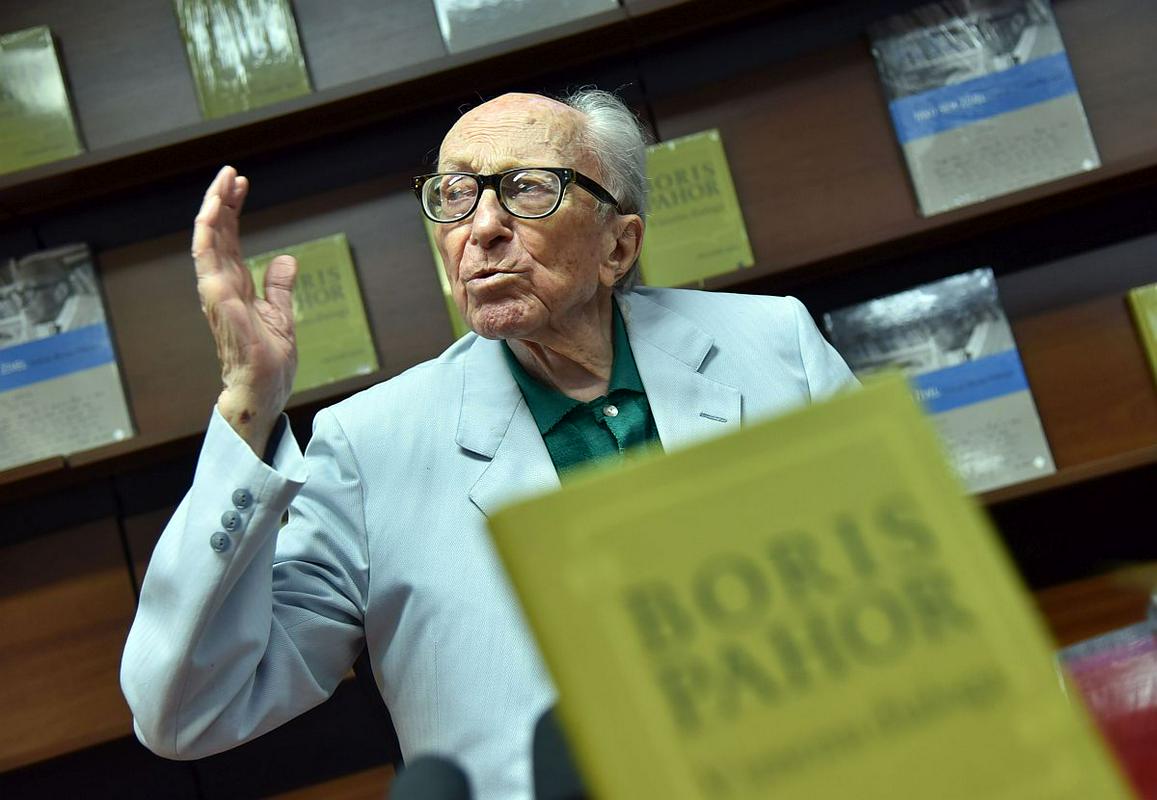
An advocate for the Slovenians living in neighbouring countries, a witness of history, a writer and thinker, Boris Pahor celebrated his 103rd birthday today in a working and sociable manner.
On his birthday, he presented his newest book "In the Name of Dialogue" (V imenu dialoga) at the Konzorcij bookshop. The book consists of diary notes, older texts, quotations and letters. The talk with the writer, from which our introductory quotation was taken, was done by Pahor’s friend and colleague, essayist Zdravko Duša, who joked that he hardly said anything from all of Pahor’s talking.
Despite his honorable age Pahor is exceptionally vital and witty. Pahor sees himself in the role of a witness, able to help younger generations preserve the memory of the atrocities of Fascism and World War II. He said that he would continue to retell his stories, including the truly shocking stories from the time he spent as a prisoner during WWII at the Natzweiler-Struthof concentration camp, until he was alive. His memories from that period were put on paper in his most famous work "Necropolis".
Contrary to the widespread conviction that young people do not care about history, Pahor did not get such an impression during his presentations across Europe. Pahor’s opinion is that young people are very interested in history and says that it just has to be presented to them in the right way. That is why he gladly accepted the invitation to present his concentration camp experiences to students on the day before Holocaust Remembrance Day. "I will come, even if they will have to bring me in a wheelchair," promised the writer, who has lately had problems with his eyesight.
Ahead of his 103rd birthday, Pahor also talked about Europe in a time of terrorism and the refugee crisis. He said he himself sees the solution in dialogue guided by common sense. Hope can be found in a world that puts man and uniqueness in all fields in the forefront, in a world that stands up to wars, barbarity and aspirations for domination. He also supports the idea of Stephane Hessel of establishing an ethical parliament: "Dialogue could be successful if, on a global level, influential politicians, representatives of different faiths, writers and other thinkers would meet in the name of dialogue."
"They would come together in the name of an intelligent human, and also in the name of capabilities made possible by the latest technology and medicine," continued Pahor, and added: "That kind of mindset could also lead to the establishment of an agreement, under which everyone would have the right to advocate their positions, but not at the expense of others. It is proven that it is possible to live in such spirit, if people believe in it." Is it so because the majority still favours peace, coexistence and respect? "That’s right. I’m talking about a global dialogue for a new sense of the world, which would put the reasonable man in the forefront. A man that would lead dialogue at an ethical level."
For years, Pahor has been emphasizing that instead of having a society based on the rule of political parties – as it is in Slovenia – there should be a dialogue on how to lead a united country: "A country has to have some kind of unity in it, otherwise it would go bust!" Pahor also notices that Slovenia still lacks national consciousness, except when the Slovenian national football team wins a match. Then we see flags everywhere. Very often many tend to mix national consciousness with nationalism: "The leftists still stand behind the words of Edvard Kardelj, who said that we know what national consciousness is, yet it leads to nationalism. The English are nationalists today because they are in love with their country and have separated from Europe ... That is not true! A nationalist is one who praises his country, but also insults others. The Germans were like that, when they claimed 'Deutschland über alles' (Germany above all else). That is wrong."
The writer and thinker persists on his absolute points – truth, freedom and national consciousness. On his bedside table Pahor has a book written by philosopher Bertrand Russell, in which it says that we have to make a distinction between a love for the homeland, the language and tradition, and nationalism. And this is what Pahor says as well. He wants to see children taught at school about the difference between national consciousness and nationalism. And also about the distinction between national consciousness and globalism.
His newest book, titled "In the Name of Dialogue", roughly consists of two parts. The first part features diary notes published in 2005 for a whole month in the Saturday supplement of the Delo daily. The second part features texts which were written between 2013 and the present day which Pahor believes are very important. According to the Cankarjeva Založba publishing house, Pahor "critically and directly focuses on known topics, writing about the challenges for a dialogue. His call for a more just world is clear and without a shadow of doubt. His faith that humanity has enough wisdom and power to find a path to lead us out of the crises, towards becoming a more ethical human being, is the message of one of the world’s last witnesses of the inferno of the concentration camps".
A. K.; translated by K. J.

































































